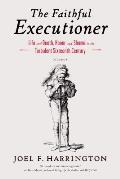 The Spring issue of Common-Place is now online with a review of Colin Calloway's Pen & Ink Witchcraft: Treaties and Treaty Making in American Indian History (Oxford University Press).
The Spring issue of Common-Place is now online with a review of Colin Calloway's Pen & Ink Witchcraft: Treaties and Treaty Making in American Indian History (Oxford University Press)."Calloway crafts an entire narrative of Native American history from the eighteenth to twenty-first centuries predicated on the negotiation of Indian treaties between indigenous peoples and Euro-Americans. Through this narrative, he asserts treaties provide "a barometer of Indian-white relations in North America," which demonstrates the "shifts in power, changing attitudes about the place of Indian peoples in American society, and contested ideas about indigenous rights in a modern constitutional democracy" (3)."
 Sarah Mayeux has an interesting review in Public Books this week in a piece titled, "Progress and Execution." She examines three books: Robert A. Ferguson's Inferno: An Anatomy of American Punishment (Harvard), Joel F. Harrington's The Faithful Executioner: Life and Death, Honor and Shame in the Turbulent Sixteenth Century (Farrar, Straus & Giroux), and Evan J. Mandery's A Wild Justice: The Death and Resurrection of Capital Punishment in America (Norton). Of Mandery's work, Mayeux writes,
Sarah Mayeux has an interesting review in Public Books this week in a piece titled, "Progress and Execution." She examines three books: Robert A. Ferguson's Inferno: An Anatomy of American Punishment (Harvard), Joel F. Harrington's The Faithful Executioner: Life and Death, Honor and Shame in the Turbulent Sixteenth Century (Farrar, Straus & Giroux), and Evan J. Mandery's A Wild Justice: The Death and Resurrection of Capital Punishment in America (Norton). Of Mandery's work, Mayeux writes,"Mandery’s tick-tock attention to deals struck over lunch meetings in clubby DC watering holes and to details of which argument was made by which law clerk in which memo is not merely necessary scaffolding for the storytelling mode. It is also the stuff of what I take to be his underlying argument: it may not have been inevitable that the death penalty would wither away, but it was also not inevitable that it would persist. The death penalty’s revival in the modern United States was not the satisfaction of some innate national thirst for vengeance, but rather the contingent outcome of interaction between particular litigation strategies, personal affinities, and institutional conventions with larger political whirlwinds and social contexts."
 H-Net posted many new reviews this week, including several on war, imperialism, and diplomacy. For example, there is a review of Britain and the Bomb: Nuclear Diplomacy, 1964-1970 by David James Gill (Stanford University Press), a review of Marigold: The Lost Chance for Peace in Vietnam by James G. Hershberg (Woodrow Wilson Center Press), a review of Into the Desert: Reflections on the Gulf War edited by Jeffrey A. Engel (Oxford), a review of From Victory to Vichy: Veterans in Interwar France by Chris Millington (Manchester University Press), and a review of Brokers of Empire: Japanese Settler Colonialism in Korea, 1876-1945 (Harvard University Press).
H-Net posted many new reviews this week, including several on war, imperialism, and diplomacy. For example, there is a review of Britain and the Bomb: Nuclear Diplomacy, 1964-1970 by David James Gill (Stanford University Press), a review of Marigold: The Lost Chance for Peace in Vietnam by James G. Hershberg (Woodrow Wilson Center Press), a review of Into the Desert: Reflections on the Gulf War edited by Jeffrey A. Engel (Oxford), a review of From Victory to Vichy: Veterans in Interwar France by Chris Millington (Manchester University Press), and a review of Brokers of Empire: Japanese Settler Colonialism in Korea, 1876-1945 (Harvard University Press).Also on H-Net is a review of Steven W. Bender's Run for the Border: Vice and Virtue in US-Mexico Border Crossings (NYU Press).
"In Run for the Border: Vice and Virtue in U.S.-Mexico Border Crossings, Bender takes a different approach. Rather than discussing the border itself—the official line between one and the other—Bender argues that the border is the place of transformation, a permeable barrier that allows those seeking something unavailable on their side to move through the border to the other side, the side where the desired objects are available. Thus, this study is not necessarily border studies as much as an examination of a variety of social issues, namely, the vice in the title, with international dimensions. For Bender the border itself means little. It is a mythical construct that poses a myriad of political ramifications. What matters is not the physical or even imaginary line but the markedly distinct societies on each side of it and the impacts of border crossers to each society."New Books in History has a new interview with Donald Critchlow about his new book When Hollywood Was Right: How Movie Stars, Studio Moguls, and Big Business Remade American Politics (Cambridge University Press).
There are also several biographies being reviewed this weekend. Fred Kaplan's John Quincy Adams: American Visionary (Harper) is reviewed in both The Washington Post (here) and in The New York Times (here). The New York Times also includes a review about Adam's wife as well: Louise Catherine: The Other Mrs. Adams by Margery M. Heffron (Yale). There is a review of Harvey Kaye's The Fight for the Four Freedoms: What Made FDR and the Greatest Generation Truly Great (Simon & Schuster) here in the Post and an excerpt of the book in Salon. And, Gordon Wood reviews James Madison: A Life Reconsidered by Lynne Cheney (Viking).
"Cheney’s biography is lucidly written (her description of the Madisons’ actions during the burning of the buildings in the capital in 1814 is especially dramatic), and she clearly brings to life the character and personality of Madison. Apart from Ralph Louis Ketcham’s 1971 life, this is probably the best single-volume biography of Madison that we now have."
